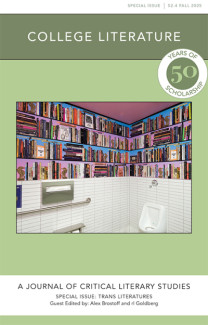
Johns Hopkins UniversityEst. 1876
America’s First Research University
The Forms of Informal Empire: Britain, Latin America, and Nineteenth-Century Literature

A few years ago, at a get-together in Santiago, Chile, I met a local man I’ll call Luis. Amid small talk, he mentioned that he supervises a number of his family’s copper mines in the north. When I asked him how his family came to own them, he shrugged and said only: “My great-grandfather was English.” I had not told Luis that I was in Santiago precisely to research the history of British involvement in Latin America, so he had no reason to expect my familiarity with the subject. But those four words, for anyone passingly familiar with the economic history of Latin America, are self-explanatory.
When Latin America won its independence in the early nineteenth century, Britain was waiting, pocketbook in hand. Through loans, purchases, and investments, Europeans—but especially the British—took advantage of the vulnerable post-war Latin American economies to gain control over industries ranging from railroads to agriculture to leather. We call this informal empire.
Scholars and history books tend to treat the British Empire as a system of formal colonies, which it was. But it was also this process of influence and coercion, leveraged by massive economic power, in territories beyond their official rule. Informal empire in Latin America had no governance structures, and yet it gave the British enormous advantage in trade deals and loan terms, it placed local industries in British hands, and it grossly exacerbated existing wealth inequalities that entrenched generational privilege for British descendants like Luis.
And yet, informal empire also forged a close alliance with that juggernaut liberal idea, freedom. For the British, Latin America was a symbol of freedom from oppressive rule. And the concept of free market economics, rapidly rising to the status of moral truth in the early nineteenth century, suggested that investment was itself a liberatory act. Both nationalism and free trade emerged together as apparent evidence for civilization’s march towards liberty. And informal empire, in yoking the two together, fashioned itself a mechanism of freedom.

What’s surprising about all of this is not that free markets aren’t actually free. It’s not news to anyone in the twenty-first century that although based in a philosophy of freedom from external constraint, economic liberalism nonetheless produces conditions of inequality that crushingly constrain billions of people. Nor is it surprising that the European Enlightenment produced philosophies and institutions built on contradiction and oppression.
What is surprising is that, despite Britain’s comfort with imperialism, and despite the long history of imperial powers managing the contradictions of their deeds, informal empire proved a difficult story to tell. To explain why and how Latin America deserved to be free, but also deserved to be bought—this didn’t lend itself well to narrative. Consider novelist, and oft-considered embodiment of the Victorian age, Anthony Trollope. Well known for his imperial enthusiasm (and attendant racism), he stumbled over informal empire, seeing the operations of financial speculation and abrogated sovereignty as antithetical to progressive narrative. His novels, therefore, represent informal empire as something ineffable, self-consuming, immoral, and unassimilable to stories of civilizational advancement. Or take Simón Bolívar, avatar of freedom in Latin America, who wanted both independence from Europe and the imperial presence of Britain, and who struggled ineffectually to gather both coherently together into a narrative of progress.
Why does that matter? It’s because stories are so important. We use them to explain who nations and communities are and how they came to be. We use them to place ourselves on a trajectory through time that points us somewhere we want to go. We use them to sort people into groups and relationships that can define them for life. And so, what I point to in my book, The Forms of Informal Empire: Britain, Latin America, and Nineteenth-Century Literature, is the way that familiar stories broke down, frayed, looped, and snarled as nineteenth-century thinkers tried to fit informal empire into the narrative of western civilization. In the very moment when informal empire might be seen as the ultimate expression of contemporary values, it nevertheless appeared to many onlookers as contradiction, hypocrisy, and paradox. It appeared at times un-narratable.
That’s a powerful thought. Institutions and systems of power can seem immense and intractable, while stories can seem small and inconsequential. But the case study of British informal empire in Latin America reminds us not only that power has to grapple with stories, but that there is no power without story in the first place. Luis’s four words tell a long, complicated story of familial generations, national communities, power imbalances, freedoms taken and freedoms constrained, enduring contradiction, and the long shadows cast by the narratives we settle on.
Order The Forms of Informal Empire: Britain, Latin America, and Nineteenth-Century Literature -- published on June 23, 2020 -- at the following link: https://jhupbooks.press.jhu.edu/title/forms-informal-empire
Jessie Reeder is an assistant professor of English at Binghamton University. She is the author of The Forms of Informal Empire: Britain, Latin America, and Nineteenth-Century Literature.


